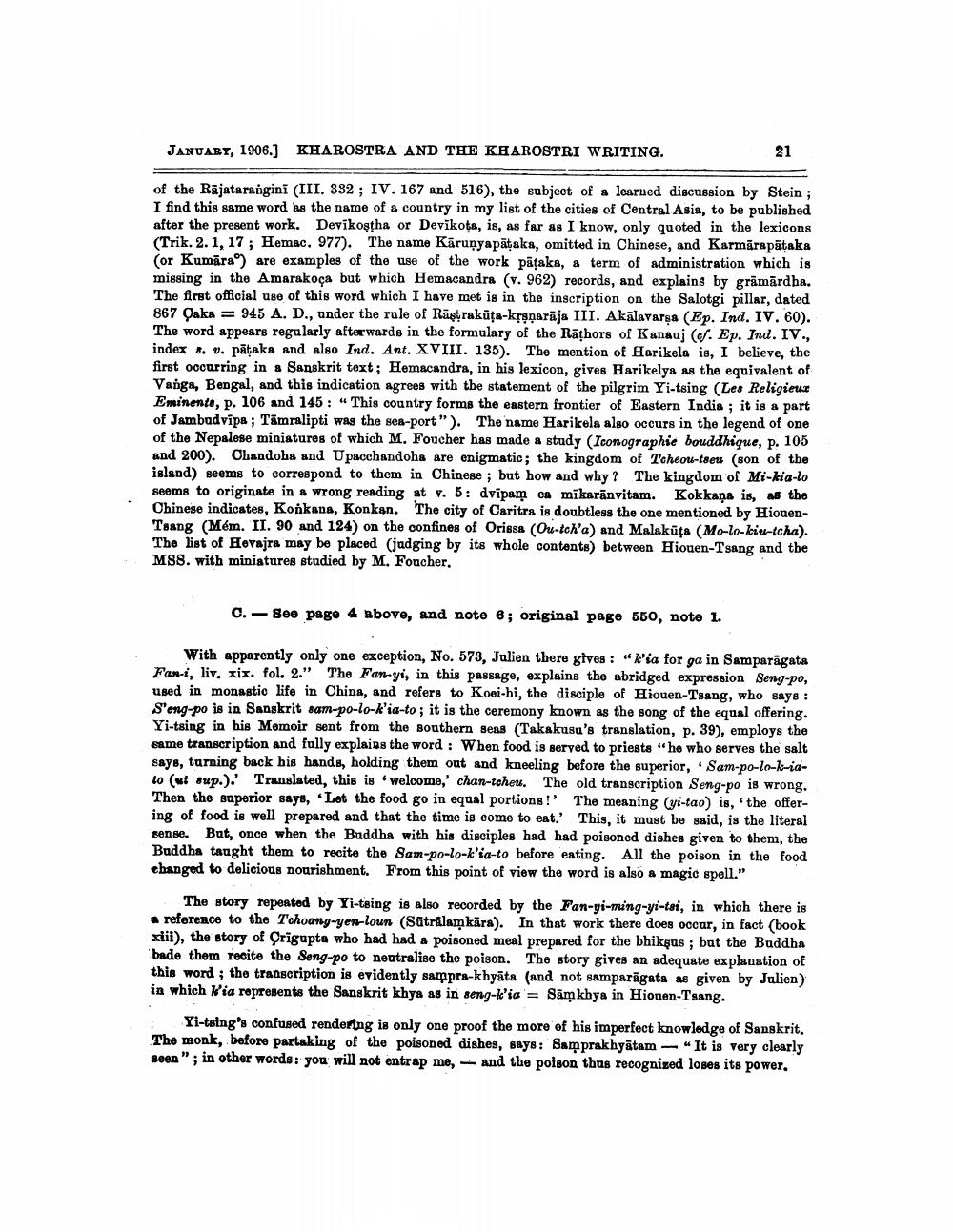________________
JANUARY, 1906.) KHAROSTRA AND THE KHAROSTRI WRITING.
21
of the Rājatarangini (III. 332 ; IV. 167 and 516), the subject of a learued discussion by Stein; I find this same word as the name of a country in my list of the cities of Central Asia, to be published after the present work. Devikoştha or Devikots, is, as far as I know, only quoted in the lexicons (Trik. 2.1, 17; Hemac. 977). The name Kāruṇyapätaka, omitted in Chinese, and Karmarapātaka (or Kumāra) are examples of the use of the work pataka, a term of administration which is missing in the Amarakoça but which Hemacandra (v. 962) records, and explains by grāmārdha. The first official use of this word which I have met is in the inscription on the Salotgi pillar, dated 867 Çaka = 945 A. D., under the rule of Rāştrakūta-krsnarāja III. Akālavarsa (Ep. Ind. IV. 60). The word appears regularly afterwards in the formulary of the Rāthors of Kanauj (f. Ep. Ind. IV., index 8. v. pāțaka and also Ind. Ant. XVIII. 135). The mention of Harikela is, I believe, the first occurring in a Sanskrit text; Hemacandra, in his lexicon, gives Harikelya as the equivalent of Vanga, Bengal, and this indication agrees with the statement of the pilgrim Yi-tsing (Les Religieux Eminento, p. 106 and 145: "This country forms the eastern frontier of Eastern India; it is a part of Jambudvípa ; Tâmralipti was the sea-port"). The name Harikela also occurs in the legend of one of the Nepalese miniatures of which M. Foucher has made a study (Iconographie bouddhique, p. 105 and 200). Chandoba and Upacchandoha are enigmatic; the kingdom of Tcheon-tset (son of the island) seems to correspond to them in Chinese ; but how and why? The kingdom of Mi-kia-lo seems to originate in a wrong reading at v. 5: dvipam ca mikarānvitam. Kokkaņa is, as the Chinese indicates, Konkana, Konkan. The city of Caritra is doubtless the one mentioned by HionenTsang (Mém. II. 90 and 124) on the confines of Orissa (Ou-tch'a) and Malakūta (Mo-lo-kin-icha). The list of Hovajra may be placed (jadging by its whole contents) between Hiouen-Tsang and the MSS. with miniatures studied by M. Foucher,
0.-800 page 4 above, and noto 6; original page 550, note 1.
With apparently only one exception, No. 573, Julien there gives: "l'ia for ga in Samparāgata Fan-i, liv. xix. fol. 2." The Fan-yi, in this passage, explains the abridged expression Seng-po, used in monastic life in China, and refers to Koei-hi, the disciple of Hiouen-Tsang, who says : S'eng-po is in Sanskrit sam-po-lo-k'ia-to; it is the ceremony known as the song of the equal offering. Yi-tsing in his Memoir sent from the southern seas (Takakusu's translation, p. 39), employs the same transcription and fully explains the word : When food is served to priests "he who serves the salt saye, turning back his hands, holding them out and kneeling before the superior, Sam-po-lo-k-iato (ut sup.). Translated, this is welcome,' chan-tcheu. The old transcription Seng-po is wrong. Then the superior says, Let the food go in equal portions!' The meaning (yi-tao) is, the offering of food is well prepared and that the time is come to eat.' This, it must be said, is the literal sense. But, once when the Buddha with his disciples had had poisoned dishes given to them, the Buddha taught them to recite the Sam-po-lo-k'ia-to before eating. All the poison in the food changed to delicious nourishment. From this point of view the word is also a magic spell."
The story repeated by Yi-tsing is also recorded by the Fan-yi-ming-yi-tai, in which there is a reference to the Tchoang-yen-loun (Sūträlamkāra). In that work there does occur, in fact (book xiii), the story of Crigupta who had had a poisoned meal prepared for the bhikgus; but the Buddha bade them recite the Song-po to neutralise the poison. The story gives an adequate explanation of this word; the transcription is evidently sampra-khyāta (and not samparigata as given by Julien) in which Kia represents the Sanskrit khya as in seng-k'ia' = Samkhya in Hiouen-Tsang.
: Yi-tsing's confused rendering is only one proof the more of his imperfect knowledge of Sanskrit. The monk, before partaking of the poisoned dishes, says: Samprakhyātam - It is very clearly soen"; in other words: you will not entrap me, and the poison thus recognized loses its power,




